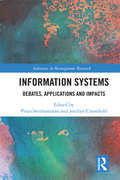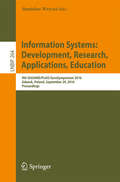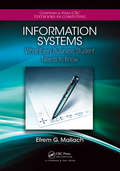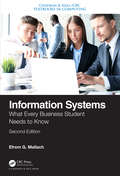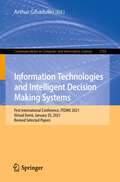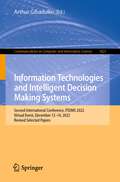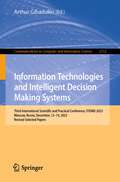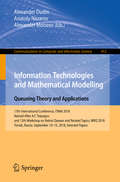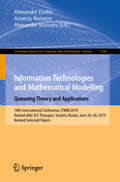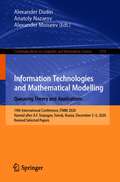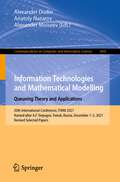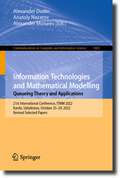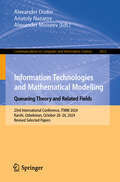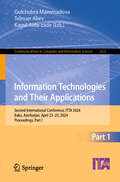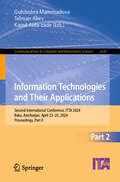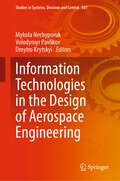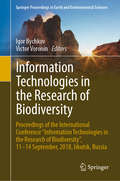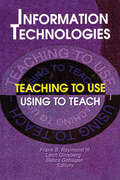- Table View
- List View
Information Systems: A Manager's Guide to Harnessing Technology version 1.2
by John GallaugherInformation Systems: A Manager's Guide to Harnessing Technology V1.2 is intended for use in undergraduate and/or graduate courses in Management Information Systems and Information Technology. Version 1.2 of John's book retains the same structure and theory of version 1.1, but refreshes key statistics, examples, and brings case material up to date (vital when covering firms that move as fast as Facebook, Google, and Netflix). Adopting version 1.2 guarantees your students will have the most current text on the market, drawing real and applicable lessons from material that will keep your class offerings current and accessible.
Information Systems: A Manager's Guide to Harnessing Technology version 1.3
by John GallaugherInformation Systems: A Manager's Guide to Harnessing Technology V 1.3 is intended for use in undergraduate and/or graduate courses in Management Information Systems and Information Technology. Version 1.3 of John's book retains the same structure and theory of version 1.1 and V 1.2, but refreshes key statistics, examples, and brings case material up to date (vital when covering firms that move as fast as Facebook, Google, and Netflix). For example; the Netflix chapter - Updates address the major changes impacting Netflix in 2011, including the response to the firm's pricing changes, the failed Qwikster service split, recent developments impacting the streaming and DVD-by-mail businesses, a comparison table detailing the stark differences between the firm's two offerings (DVD & streaming), updated statistics, learning objectives, and additional exercises and updates to the Google chapter - Updated text/images for currency, additional sub-sections on the firm's Google+ launch and the acquisition of Motorola Mobility. Adopting version 1.3 guarantees your students will have the most current text on the market, drawing real and applicable lessons from material that will keep your class offerings current and accessible.
Information Systems: A Manager's Guide to Harnessing Technology version 1.4
by John GallaugherInformation Systems: A Manager’s Guide to Harnessing Technology V 1.4 is intended for use in undergraduate and/or graduate courses in Management Information Systems and Information Technology. Version 1.4 of John's book retains the same structure and theory of the earlier versions, but Version 1.4 updates key statistics and examples, and includes up-to-date case material, such as Pinterest and Facebook’s Instagram acquisition. Adopting version 1.4 guarantees your students will have the most current text on the market, drawing real and applicable lessons from material that will keep your class offerings current and accessible.
Information Systems: A Manager's Guide to Harnessing Technology, Version 3.0
by John GallaugherWHAT'S NEW IN 3.0:<P><P> UPDATED, MORE RELEVANT INFORMATION:<P> New coverage including Uber, WhatsApp, Facebook, and bitcoin breathes fresh life into existing material. The popular Zara and Netflix case studies remain but contain refreshed information.<P> EMPHASIS ON SOCIAL MEDIA:<P> Instagram, SnapChat, WhatsApp, Tinder, Secret, and Whisper all receive mention, ensuring relevancy and proper understanding of the current field.<P> MOBILE VS. DESKTOP:<P> In a number of renamed chapters, Gallaugher weighs the pros and cons of social media use on desktop computers and mobile devices, prompting classroom dialogue surrounding the rise of different technologies and how businesses and managers adjust to emerging trends.<P> DISCUSSION OF THE SHARING ECONOMY:<P> With the addition of an entirely new chapter focused on the sharing economy, Gallaugher introduces examples of citizens coming together to create or share resources across markets.<P> For a comprehensive list of what's new in version 3.0, visit Gallaugher’s blog.<P> John Gallaugher of Boston College was one of BusinessWeek’s “Professors of the Year.” His widely popular textbook offers a proven approach that has garnered student praise and increased information systems enrollment. There is no other Information Systems author today who keeps his text as "up-to-the-month" current. <P> For regular updates, follow Gallaugher’s blog, The Week in Geek, and connect with him on Twitter at @gallaugher.<P> This textbook is suitable for these courses:Undergraduate or graduate courses in Management Information Systems and Information Technology<P> This textbook is suitable for 2 and 4 year institutions.<P> PEDAGOGICAL FEATURES:<P> FOCUS ON STRATEGIC THINKING:<P> Rather than lead with technical topics, the book starts with strategic thinking, focusing on big-picture issues that have confounded experts but will engage students.<P> ENGAGING CASE STUDIES:<P> While chapters introduce concepts, cases on approachable, exciting firms across industries further challenge students to apply what they've learned.<P> CUSTOMIZABILITY:<P> The Flat World Knowledge publishing model allows instructors to adapt the textbook to the exact needs of their specific class and student body. <P>
Information Systems: A Manager's Guide to Harnessing Technology, v. 5.0
by John GallaugherWHAT'S NEW IN 5.0:<P><P> FRESHLY UPDATED:<P> Every chapter has received an update to ensure that it covers the latest topics and material. Today’s cutting edge firms and headline grabbing topics are presented through durable frameworks and concepts.<P> WORLDWIDE TRENDS IN TECH DEVELOPMENTS:<P> Included are updates and statistics on companies and technologies being developed around the world. China started the century as a nation largely unplugged and offline, but now has more internet users than any other country. In Sub-Saharan Africa, 70% of the population lives within mobile cell phone coverage. Now, even drones are affordable enough to be used as a delivery system in places with poor infrastructure.<P> PROTEUS, A PILL CAMERA:<P> A mini-case in the “Moore’s Law and More” chapter discusses the launch of Proteus’s low cost and efficient “PillCam.” Using small sensors and powered by digestive acids, the pill allows doctors to see a unique perspective inside the human body (literally).<P> SOCIAL MEDIA POWERHOUSE:<P> Statistics on the massive amount of new social networks and acquisitions in the marketplace have all been updated. New content includes Microsoft’s acquisition of LinkedIn, Slack’s dominant presence in the business space, and the rise of companies like HubSpot. New subsections discuss Twitter and the rise of microblogging, as well as Facebook’s dominant news feed and its strong position against Google’s advertising monopoly.<P> CUTTING EDGE COVERAGE:<P> From Facebook’s move to make Messenger a platform to Google’s evolution to Alphabet, students will feel their text and classroom are alive with the most current content available.<P> For a comprehensive list of what's new in version 5.0, visit Gallaugher’s blog.<P> John Gallaugher of Boston College has been named one of Entrepreneur Magazine’s “Gurus to Grads.” His popular and award-winning textbook offers a proven approach that has garnered student praise and increased information systems enrollment. Each year Gallaugher meets with scores of tech industry executives from Silicon Valley to sub-Saharan Africa, and there is no other Information Systems author today who keeps his text as "up-to-the-month" current. <P> For regular updates, follow Gallaugher’s blog, The Week in Geek, and connect with him on Twitter at @gallaugher.<P> This textbook is suitable for these courses:Undergraduate or graduate courses in Management Information Systems and Information Technology<P> This textbook is suitable for 2 and 4 year institutions.<P> PEDAGOGICAL FEATURES:<P> FOCUS ON STRATEGIC THINKING:<P> Rather than lead with technical topics, the book starts with strategic thinking, focusing on big-picture issues that have confounded experts but will engage students.<P> CURRENT, ENGAGING AND HOLISTIC CASE STUDIES:<P> While chapters introduce concepts, cases on approachable, exciting firms across industries further challenge students to apply what they've learned. Students love how concepts are introduced in a text that reads more like Wired and the Wall Street Journal than a conventional textbook.<P> CONCEPTS:<P> Chapters cover not only strategy and technology basics, but critical and cutting edge concepts such as data analytics, security, social media, the sharing economy, disruptive innovation, network effects and platform creation, open source, and cloud computing.<P> FASCINATING FIRMS:<P> In-depth profiles include firms that students know and are eager to learn more about. Amazon, Facebook, Google, Netflix, Rent the Runway, and Zara are among the firms that get extended coverage, along with mini-cases on Airbnb, Uber, and more.<P> CUSTOMIZABILITY:<P> The Flat World Knowledge publishing model allows instructors to adapt the textbook to the exact needs of their specific class and student body. See how easy it is to customize a textbook in this 4 minute demo: Flat World Editing Platform Video Demo
Information Systems: A Manager’s Guide to Harnessing Technology
by John GallaugherThe text offers a proven approach that has garnered student praise, increased IS enrollment, and engaged students to think deeper and more practically about the space where business and technology meet. Every topic is related to specific business examples, so students gain an immediate appreciation of its importance. Rather than lead with technical topics, the book starts with strategic thinking, focusing on big-picture issues that have confounded experts but will engage students. And while chapters introduce concepts, cases on approachable, exciting firms across industries further challenge students to apply what they've learned, asking questions like: Why was NetFlix able to repel Blockbuster and WalMart? How did Harrah's Casino's become twice as profitable as comparably-sized Caesar's, enabling the former to acquire the latter? How does Spain's fashion giant Zara, a firm that shuns the sort of offshore manufacturing used by every other popular clothing chain, offer cheap fashions that fly off the shelves, all while achieving growth rates and profit margins that put Gap to shame? What's an IPO and can a technology alternative push out investment bankers and insiders to the benefit of entrepreneurs and small investors? Why is Google more profitable than Disney? Is Facebook really worth $15 billion?
Information Systems: Debates, Applications and Impacts
by Jocelyn Cranefield Priya SeetharamanThis book captures a range of important developments that have occurred in Information Systems over the last forty years, with a particular focus on India and the developing world. Over this time, Information and Communications Technology (ICT) and Information Systems (IS) have come to play a critical role in supporting, complementing and automating managerial decisions, shaping and transforming industries, and contributing to deep societal and economic change. This volume examines a range of topics for those interested in the adoption and use of these technologies across varied situations. It combines empirical studies on the application and impact of IS with commentaries, debates and insights on the transformative role that IT and the IT industry have played, and continue to play, within India as well as globally. The book draws attention to issues and challenges that organizations grapple with in tech-enabled environments, and provides insights on the role of automation and computational techniques. It explores the global impact of the technology revolution on economic growth and development, electronic globalization, and the wider opportunities and challenges of a hi-tech world. The chapters cover various themes such as e-government in India, internet-based distribution systems, internet banking, and use of collaborative IT tools and functions to support virtual teams in the software industry and the business process outsourcing industry. Other chapters focus on methodological advances, such as systems thinking which finds applications in organizational decision-making, and the use of fuzzy logic. This volume will interest professionals and scholars of information technology and information systems, computer studies, IT systems, economics, and business and management studies.
Information Systems: Development, Research, Applications, Education
by Stanislaw WryczaThis book constitutes the refereed proceedings of the SIGSAND/PLAIS EuroSymposium 2016 titled Information Systems: Development, Research, Applications, Education, held in Gdansk and Sopot, Poland, on September 29, 2016. The objective of this symposium is to promote and develop high-quality research on all issues related to systems analysis and design (SAND). It provides a forum for SAND researchers and practitioners in Europe and beyond to interact, collaborate, and develop their field. The 14 papers presented in this volume were carefully reviewed and selected from 34 submissions. They are organized in topical sections on information systems development, information systems management, and information systems learning.
Information Systems: What Every Business Student Needs to Know (Chapman & Hall/CRC Textbooks in Computing)
by Efrem G. MallachMost information systems (IS) texts overwhelm business students with overly technical information they may not need in their careers. This textbook takes a new approach to the required IS course for business majors. For each topic covered, the text highlights key "Take-Aways" that alert students to material they will need to remember during their careers. Sections titled "Where You Fit In" and "Why This Chapter Matters" explain how the topics being covered will impact students once they are on the job. Review questions, discussion questions, and summaries are included in each chapter.
Information Systems: What Every Business Student Needs to Know, Second Edition (Chapman & Hall/CRC Textbooks in Computing)
by Efrem G. MallachMost information systems textbooks overwhelm business students with overly technical information they may not need in their careers. This textbook takes a new approach to the required information systems course for business majors. For each topic covered, the text highlights key "Take-Aways" that alert students to material they will need to remember during their careers. Sections titled "Where You Fit In" and "Why This Chapter Matters" explain how the topics being covered will impact students on the job. Review questions, discussion questions, and summaries are also included. This second edition is updated to include new technology, along with a new running case study. Key features: Single-mindedly for business students who are not technical specialists Doesn&’t try to prepare IS professionals; other courses will do that Stresses the enabling technologies and application areas that matter the most today Based on the author&’s real-world experience Up to date regarding technology and tomorrow&’s business needs This is the book the author—and, more importantly, his students—wishes he had when he started teaching. Dr. Mallach holds degrees in engineering from Princeton and MIT, and in business from Boston University. He worked in the computer industry for two decades, as Director of Strategic Planning for a major computer firm and as co-founder/CEO of a computer marketing consulting firm. He taught information systems in the University of Massachusetts (Lowell and Dartmouth) business schools for 18 years, then at Rhode Island College following his retirement. He consults in industry and serves as Webmaster for his community, in between hiking and travel with his wife.
Information Technologies and Intelligent Decision Making Systems: First International Conference, ITIDMS 2021, Virtual Event, January 25, 2021, Revised Selected Papers (Communications in Computer and Information Science #1703)
by Arthur GibadullinThis book constitutes selected papers presented at the First International Scientific and Practical Conference on Information Technologies and Intelligent Decision Making Systems, ITIDMS 2021, held as Virtual Event in January, 2021.The 13 presented papers were thoroughly reviewed and selected from the 41 submissions. The conference was held with the aim of summarizing international experience in the field of information, digital and intellectual development, within which proposals were formulated for digital and information transformation, the development of computer models, information technologies, automated and computing processes. A distinctive feature of the conference is that it presented reports of authors from China, Uzbekistan, Lebanon, Poland, Kazakhstan, Bulgaria and Russia. Researchers from different countries presented the process of transition of the information and digital path of development, presented the main directions and developments that can improve the efficiency and development.
Information Technologies and Intelligent Decision Making Systems: Second International Conference, ITIDMS 2022, Virtual Event, December 12–14, 2022, Revised Selected Papers (Communications in Computer and Information Science #1821)
by Arthur GibadullinThis book constitutes the proceedings of the Second International Conference on Information Technologies and Intelligent Decision Making Systems, ITIDMS 2022, held as a virtual event, December 12–14, 2022.The 14 papers presented in this volume were carefully reviewed and selected from 38 submissions. The conference was held with the aim of developing and exchanging international experience in the field of information, digital and intellectual technologies, within the framework of which proposals were formulated for digital, intellectual and infor-mation transformation, the development of computer models and the improvement of automated and computing processes. A distinctive feature of the conference is that it presented reports of authors from USA, Canada, Bangladesh, Uzbekistan and Russia. Researchers from different countries presented the process of transition of the information and digital path of development, presented the main directions and de-velopments that can improve the efficiency and development.
Information Technologies and Intelligent Decision Making Systems: Third International Scientific and Practical Conference, ITIDMS 2023, Moscow, Russia, December, 12-14, 2023, Revised Selected Papers (Communications in Computer and Information Science #2112)
by Arthur GibadullinThis book constitutes the refereed post proceedings of the Third International Scientific and Practical Conference on Information Technologies and Intelligent Decision Making Systems, ITIDMS 2023, held in Moscow, Russia, during December, 12-14, 2023. The 18 full papers included in this book were carefully reviewed and selected from 54 submissions. The papers presented in this volume focus on topics such as digital, intellectual and information transformation, the development of computer models and the improvement of automated and computing processes.
Information Technologies and Mathematical Modelling. Queueing Theory and Applications: 17th International Conference, ITMM 2018, Named After A.F. Terpugov, and 12th Workshop on Retrial Queues and Related Topics, WRQ 2018, Tomsk, Russia, September 10-15, 2018, Selected Papers (Communications in Computer and Information Science #912)
by Alexander Dudin Anatoly Nazarov Alexander MoiseevThis book constitutes the proceedings of the 17th International Conference on Information Technologies and Mathematical Modelling, ITMM 2018, named after A.F. Terpugov, and the 12th Workshop on Retrial Queues and Related Topics, held in Tomsk, Russia, in September 2018. The 30 papers presented in this volume were carefully reviewed and selected from 84 submissions. The conference covers various aspects of information technologies, focusing on queueing theory, stochastic processes, Markov processes, renewal theory, network performance equation and network protocols.
Information Technologies and Mathematical Modelling. Queueing Theory and Applications: 18th International Conference, ITMM 2019, Named after A.F. Terpugov, Saratov, Russia, June 26–30, 2019, Revised Selected Papers (Communications in Computer and Information Science #1109)
by Alexander Dudin Anatoly Nazarov Alexander MoiseevThis book constitutes the proceedings of the 18th International Conference on Information Technologies and Mathematical Modelling, ITMM 2019, named after A.F. Terpugov, held in Saratov, Russia, in June 2019. The 25 full papers presented in this volume were carefully reviewed and selected from 72 submissions. The conference covers various aspects of information technologies, focusing on queueing theory, stochastic processes, Markov processes, renewal theory, network performance equation and network protocols.
Information Technologies and Mathematical Modelling. Queueing Theory and Applications: 19th International Conference, ITMM 2020, Named after A.F. Terpugov, Tomsk, Russia, December 2-5, 2020, Revised Selected Papers (Communications in Computer and Information Science #1391)
by Alexander Dudin Anatoly Nazarov Alexander MoiseevThis book constitutes revised selected papers of the 19th International Conference on Information Technologies and Mathematical Modelling, ITMM 2020, named after A.F. Terpugov, held in Tomsk, Russia, in December 2020. The 31 full papers presented in this volume were carefully reviewed and selected from 82 submissions. The conference covers various aspects of information technologies, focusing on queueing theory, stochastic processes, Markov processes, renewal theory, network performance equation and network protocols.
Information Technologies and Mathematical Modelling. Queueing Theory and Applications: 20th International Conference, ITMM 2021, Named after A.F. Terpugov, Tomsk, Russia, December 1–5, 2021, Revised Selected Papers (Communications in Computer and Information Science #1605)
by Alexander Dudin Anatoly Nazarov Alexander MoiseevThis book constitutes revised selected papers of the 20th International Conference on Information Technologies and Mathematical Modelling, ITMM 2021, named after A.F. Terpugov, held in Tomsk, Russia, in December 2021. Due to the COVID-19 pandemic the conference was held in a virtual mode. The 28 full papers presented in this volume were carefully reviewed and selected from 89 submissions. The conference covers various aspects of information technologies, focusing on queueing theory, stochastic processes, Markov processes, renewal theory, network performance equation and network protocols.
Information Technologies and Mathematical Modelling. Queueing Theory and Applications: 21st International Conference, ITMM 2022, Karshi, Uzbekistan, October 25–29, 2022, Revised Selected Papers (Communications in Computer and Information Science #1803)
by Alexander Dudin Anatoly Nazarov Alexander MoiseevThis book constitutes the refereed proceedings of the 21st International Conference on Information Technologies and Mathematical Modelling. Queueing Theory and Applications, ITMM 2022, held in Karshi, Uzbekistan, during October 25–29, 2022. The 19 full papers included in this book were carefully reviewed and selected from 89 submissions. The papers are devoted to new results in queueing theory and its applications. Its target audience includes specialists in probabilistic theory, random processes, mathematical modeling as well as engineers engaged in logical and technical design and operational management of data processing systems, communication, and computer networks.
Information Technologies and Mathematical Modelling. Queueing Theory and Applications: 22nd International Conference, ITMM 2023 and 14th International Workshop, WRQ 2023, Tomsk, Russia, December 4–9, 2023, Revised Selected Papers (Communications in Computer and Information Science #2163)
by Alexander Dudin Anatoly Nazarov Alexander MoiseevThis book constitutes the refereed proceedings of the 2nd International Conference, ITMM 2023 and 14th International Workshop, WRQ 2023, held in Tomsk, Russia, during December 4–9, 2023. The 23 full papers included in this book were carefully reviewed and selected from 96 submissions. The papers are devoted to new results in queueing theory and its applications, and also related areas of probabilistic analysis. Its target audience includes specialists in probabilistic theory, random processes, and mathematical modeling as well as engineers engaged in logical and technical design and operational management of data processing systems, communication, and computer networks.
Information Technologies and Mathematical Modelling. Queueing Theory and Related Fields: 23rd International Conference, ITMM 2024, Karshi, Uzbekistan, October 20–26, 2024, Revised Selected Papers (Communications in Computer and Information Science #2472)
by Alexander Dudin Anatoly Nazarov Alexander MoiseevThis book constitutes the refereed proceedings of the 23rd International Conference on Information Technologies and Mathematical Modelling. Queueing Theory and Related Fields, ITMM 2024, held in Karshi, Uzbekistan, during October 20–26, 2024. The 26 full papers included in this book were carefully reviewed and selected from 136 submissions. The papers are devoted to new results in queueing theory and its applications, and also related areas of probabilistic analysis. Its target audience includes specialists in probabilistic theory, random processes, and mathematical modeling as well as engineers engaged in logical and technical design and operational management of data processing systems, communication, and computer networks.
Information Technologies and Their Applications: Second International Conference, ITTA 2024, Baku, Azerbaijan, April 23–25, 2024, Proceedings, Part I (Communications in Computer and Information Science #2225)
by Telman Aliev Gulchohra Mammadova Kamil Aida-ZadeThe two-volume set CCIS 2225 and 2226 constitutes the proceedings of the Second International Conference on Information Technologies and Their Applications, ITTA 2024, held in Baku, Azerbaijan, during April 23-25, 2024. The 51 full papers and 9 short papers presented were carefully reviewed and selected from 200 submissions. They were organized in the following topical sections: Part I - information technology in intelligent systems; and information technology in modeling. Part II - information technology applied in construction, industry, and engineering; and information technology in decision making.
Information Technologies and Their Applications: Second International Conference, ITTA 2024, Baku, Azerbaijan, April 23–25, 2024, Proceedings, Part II (Communications in Computer and Information Science #2226)
by Telman Aliev Gulchohra Mammadova Kamil Aida-ZadeThe two-volume set CCIS 2225 and 2226 constitutes the proceedings of the Second International Conference on Information Technologies and Their Applications, ITTA 2024, held in Baku, Azerbaijan, during April 23-25, 2024. The 51 full papers and 9 short papers presented were carefully reviewed and selected from 200 submissions. They were organized in the following topical sections: Part I - information technology in intelligent systems; and information technology in modeling. Part II - information technology applied in construction, industry, and engineering; and information technology in decision making.
Information Technologies in the Design of Aerospace Engineering (Studies in Systems, Decision and Control #507)
by Mykola Nechyporuk Volodymyr Pavlikov Dmytro KrytskyiThis book proposes a solution to the problem of incorrect use of automation tools to perform complex design work. Currently, a large number of start-up projects are non-professional design bureaus that show a huge amount of their achievements. In reality, most of these achievements burst like soap bubbles. This is due to the low-quality and inefficient use of information technology in this industry. The book highlights advanced information technologies in the fields of design, machine learning, and computer vision.
Information Technologies in the Research of Biodiversity: Proceedings of the International Conference "Information Technologies in the Research of Biodiversity", 11–14 September, 2018, Irkutsk, Russia (Springer Proceedings in Earth and Environmental Sciences)
by Igor Bychkov Victor VoroninThis book offers a collection of papers presented at the First International Conference” Information Technologies in the Research of Biodiversity” that was held from 11-14 September 2018 in Irkutsk (Russia). Papers in this book cover areas of interaction of knowledge on biodiversity and information technologies. The main topics include: methods, models, software systems for the analysis of biodiversity data; global data portals; information and analytical systems on biodiversity; application of remote methods in vegetation mapping; theoretical fundaments and organization technologies of the information and telecommunications infrastructures.
Information Technologies: Teaching to Use—Using to Teach
by Leon Ginsberg Frank B Raymond Iii Debra GohaganThis insightful volume explores examples of the use of technology to teach social work knowledge, values, and skills across the curriculum. The chapters cover a wide range of perspectives, including international views of the role of information technology in Great Britain and Malaysia, training approaches for faculty development, and computer-based software that has the potential to transform the manner in which curriculum objectives are met. Prepare for technology-based instruction in social work education for the 21st century!Information Technologies: Teaching to Use--Using to Teach Information Technologies: Teaching to Use--Using to Teach, addresses your need to fully prepare today?s social work graduates to work and live in this rapidly changing, technology-enhanced environment. Based on the 1997 Information Technologies Conference: Using to Teach--Teaching to Use, held in Charleston, South Carolina, this book covers the multitude of topics that were presented on technology-based instruction as we head into the 21st century. Articles in Information Technologies range from the use of the Internet and computer applications to research projects that address the effectiveness of technology-based teaching and learning activities. It also dicusses international views on the role of information technology in Britian and Malaysia. Information Technologies gives particular attention to distance education, and it is the most thorough treatment to date of the use and teaching of technology in social work education. Specific areas you?ll gain valuable information from include:establishing a faculty development labstarting intensive faculty training sessionscomputer-based software that has the potential to transform the manner in which curriculum objectives are metinternational perspectives on information technologythe use of Geographic Information Systems technology in social work practice as a tool for improved visualization of social and economic inequalitiesmodels for teaching social work curriculum with technologyWith Information Technologies, you will gain a competetive edge in preparing your faculty and students with the latest world-wide information on studies pretaining to technology use in a social work setting. A conglomeration of diverse and well-researched articles on the use of technology to enhance social work education await you in this special volume.

